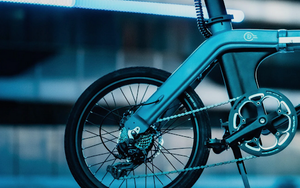Is An Electric Scooter Better Than A Petrol Scooter?
Feb 09, 2024
List of Contents
-
Is an electric scooter better than petrol?
-
Understanding the basics of electric scooters
-
Key features of electric scooters
-
Advantages of electric scooters
-
Delving into the world of petrol scooters
-
Comparing performance: electric vs petrol scooters
-
Evaluating the environmental impact
-
Cost analysis: electric scooter vs petrol scooter
-
Conclusion
Is an electric scooter better than a petrol scooter?
In recent years, the debate between electric scooters and petrol scooters has gained significant traction among urban commuters and environmental enthusiasts alike. As a growing number of people look for cleaner alternatives to traditional modes of transportation, the electric scooter has emerged as a popular choice. However, it is crucial to understand the basics before delving into the world of electric scooters.
Understanding the Basics of Electric Scooters
The mechanism of electric scooters relies on a battery-powered electric motor that drives the wheels. This electric motor converts electrical energy into mechanical energy, propelling the scooter forward. The electric motor is controlled by a controller, which regulates the flow of electricity from the battery to the motor.

Key Features of Electric Scooters
Key features of electric scooters include their quiet operation, zero emissions, and ease of use.
Rechargeable Batteries
One of the key components of an electric scooter is its rechargeable battery. These batteries can be conveniently charged at home or at public charging stations. With advancements in battery technology, electric scooters now offer longer battery life and faster charging times. This means that riders can enjoy longer rides without worrying about running out of power. The availability of public charging stations also makes it easier for electric scooter riders to find a place to charge their batteries while on the go.
Minimal Noise
One of the advantages of electric scooters is their quiet operation. Unlike traditional scooters that run on petrol engines, electric scooters produce minimal noise. This makes them ideal for urban areas where noise pollution is a concern. The quiet operation of electric scooters also enhances the overall riding experience, allowing riders to enjoy the surroundings without the constant noise of an engine.
Zero Emissions
Another notable feature of electric scooters is their zero emissions. Since they run on electricity, electric scooters do not emit any harmful gases or pollutants into the atmosphere. This makes them a greener alternative to petrol-powered scooters, contributing to a cleaner and healthier environment. Electric scooters play a crucial role in reducing air pollution, particularly in densely populated cities where air quality is a major concern.
Easy to Use
In terms of ease of use, electric scooters offer a user-friendly experience. They are designed to be lightweight and compact, making them easy to manoeuvre through traffic and navigate crowded streets. Electric scooters also come with intuitive controls, allowing riders to quickly grasp how to operate them. Whether you are a beginner or an experienced rider, electric scooters provide a convenient and hassle-free mode of transportation.

Advantages of Electric Scooters
Compared to their petrol counterparts, electric scooters offer numerous advantages. Not only are they more environmentally friendly, but they also require less maintenance. Electric scooters have fewer moving parts, reducing the need for regular servicing and repairs. Additionally, the absence of a petrol engine means that there is no need for oil changes or spark plug replacements. This not only saves riders time and money but also contributes to a more sustainable and efficient mode of transportation. Many people are seeing the benefits of electric scooters over petrol versions, with more than 750,000 private e-scooters being on UK streets.
Delving into the World of Petrol Scooters
Petrol scooters, on the other hand, operate using an internal combustion engine fueled by petrol or gasoline. These engines ignite a mixture of fuel and air, resulting in the combustion process that powers the scooter. Petrol scooters have been popular for decades due to their convenience and widespread availability of petrol.
Notable characteristics of petrol scooters include their higher speeds and superior acceleration compared to electric scooters. Petrol scooters often offer a more dynamic riding experience, making them a favoured choice for thrill-seekers and those seeking powerful performance on the road.

Comparing Performance: Electric vs Petrol Scooters
The UK scooter market is booming with a projected growth of 3.32% by 2028. When it comes to performance, it is essential to evaluate the key factors that influence ride quality and overall experience.
Speed and Power Comparison
Petrol scooters have historically outperformed electric scooters in terms of speed and power. With higher engine capacities and optimised designs, petrol scooters can reach higher speeds, making them ideal for longer commutes and faster travel. However, advancements in electric scooter technology have led to increased power and improved acceleration. Some electric scooters now boast top speeds of up to 60 miles per hour.
Range and Efficiency Analysis
Another crucial aspect to consider is the range and efficiency of these scooters. Electric scooters have traditionally been criticised for their limited range due to battery capacity constraints. However, recent developments have led to the introduction of electric scooters with extended battery life, allowing for longer trips on a single charge. Additionally, electric scooters have the advantage of regenerative braking systems, which convert kinetic energy into electrical energy, further enhancing their efficiency.
Petrol scooters, fueled by their internal combustion engines, offer a longer range and shorter refuelling times. However, the cost of petrol and the environmental impact associated with burning fossil fuels must be considered when evaluating overall efficiency.

Evaluating the Environmental Impact
One of the most significant advantages of electric scooters is their contribution to reducing emissions and minimising environmental harm.
Emissions from Electric and Petrol Scooters
Electric scooters produce zero tailpipe emissions, making them a highly sustainable transportation option. Petrol scooters, on the other hand, release carbon monoxide, nitrogen oxides, and volatile organic compounds into the atmosphere, contributing to air pollution and climate change.
A study conducted by the International Council on Clean Transportation found that electric scooters produce 50% fewer CO2 emissions compared to petrol scooters over their lifetime.
Noise Pollution Considerations
Electric scooters have the added advantage of being remarkably quiet during operation. This is in stark contrast to petrol scooters, which emit the characteristic noise associated with internal combustion engines. The reduced noise pollution from electric scooters contributes to a more pleasant and peaceful urban environment.

Cost Analysis: Electric Scooter vs Petrol Scooter
When considering the cost of ownership, it is essential to evaluate various factors, including initial purchase, maintenance, and fuel or electricity costs.
Initial Purchase and Maintenance Costs
In general, electric scooters tend to have a higher initial purchase price compared to petrol scooters. This can be attributed to the advanced technology and components required for electric propulsion. However, electric scooters often require less maintenance, as they have fewer moving parts and do not require frequent oil changes or spark plug replacements.
Petrol scooters, on the other hand, have a lower initial purchase price but may incur higher maintenance costs over time.
Fuel and Electricity Costs
When it comes to fuel or electricity costs, electric scooters offer a significant advantage. The cost of electricity is typically lower compared to petrol, resulting in substantial savings over the lifetime of the scooter. Additionally, with the transition towards renewable energy sources, such as solar and wind power, the environmental impact of charging electric scooters will continue to decrease.
It is worth noting that government incentives and subsidies for electric vehicles can further reduce the overall cost of owning an electric scooter.
Conclusion
In conclusion, the decision between electric scooters and petrol scooters largely depends on individual preferences and requirements. Electric scooters offer a cleaner and more sustainable mode of transportation, with advancements in technology improving their range, power, and overall performance. Petrol scooters, on the other hand, provide higher speeds and a more dynamic riding experience. Conducting a comprehensive analysis of factors such as speed, power, range, environmental impact, and cost is crucial in determining which type of scooter best suits your needs and aligns with your values. With the ongoing advancements in electric scooter technology and the increased focus on sustainability, the future certainly looks promising for this eco-friendly mode of transportation.






